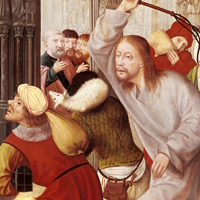I don’t know anything about “Fair Mormon”, apart from the fact that whoever came up with the group’s name has a cold river of snark running in his or her veins. I know: takes one to know one. But surely it’s not only not fair, but downright passively-aggressively hostile, for the name of one’s group to imply that other groups of people who talk about Mormonism are inherently un-fair.
Fair Mormon held a conference a couple weeks ago. I imagine it was a fine time, and uplifting for those who attended, and full of warm wishes and good cheer. Because, I suppose, of the promise of Fairness, the LDS church’s own PR director chose to speak at Fair Mormon. Michael Otterson read prepared remarks that outlined his own history with the LDS church and that tried to explain how PR works.
In a lament over the great difficulty of the LDS church’s PR, Otterson said the following:
“[T]he Church from ancient times has essentially been counter-cultural, which means that it often pushed back against social conventions and established institutions. Jesus talked a lot about sheep, but he never acted like one. He challenged social norms, associated with people who polite society rejected, and confronted the Establishment when it displayed hypocrisy. The apostles, too, fearlessly challenged convention time after time in order to teach gospel truths.”
While some of this might be true, I’m not convinced that very much of this is Fair. At least, this characterization of Christian churches seems to me a distorted reading of history and a warped insinuation concerning the present. The insinuation is that if the LDS church is on the outs of public opinion, these days, it’s because the LDS church is following Christianity’s counter-cultural tradition. But being criticized by the marginalized for standing in the way of their full participation in society is not counter-cultural, even if the criticism feels harsh. Churches that have made the status quo their mission have been, actually, counter-revolutionary, which is very much not the same thing.
In the first couple of centuries of Christianity there was no the Church with a capital “C”, and the disparate Christian communities that set themselves apart from and against Rome may well have been counter-cultural in that brief European moment. But once the empire itself had forged sufficient unity across Christendom to create a the Church, the Church served the PR purpose for which the empire created it: sustaining the ruling authority.
We can find exceptions, of course. There would have been no Civil Rights movement in the United States without African-American churches, for example. Openly advocating for radical change in an oppressive culture by deliberately breaking oppressive law (and, thus, putting life and property in jeopardy): that’s counter-cultural.
In its first decade, the LDS church may have been somewhat counter-cultural. Certainly, the very early Mormon maneuvers to reject American Christianity and to practice socialism inside the free U.S. market were counter-cultural maneuvers in the 1830’s. The ways in which Mormonism’s first decade deliberately opened spaces for women leaders and for African-Americans also ran counter to the young country’s dominant culture. The middle decades of the LDS church’s nineteenth century were dominated by Brigham Young’s obnoxiously populist, anti-government rhetoric. With the exception of Andrew Jackson, Brigham must have damned to hell from the pulpit every U.S. president of his adulthood, including Lincoln. I suppose that calling Abraham Lincoln a scoundrel must be counter-cultural.
But by the twentieth century, the LDS church had embarked on its mission to be mainstream. The past century of LDS Mormonism’s life has been decidedly pro-cultural—that is, affirmative of the economic and social mores radiating from what seem to be America’s center. By the 1950’s, the LDS church had managed to align itself, solidly, with Ike-Nation, even so far as to have one of its own in Eisenhower’s cabinet. To the extent that the halting revolution that came in the following decades in the form of the Civil Rights movement, the fight for the Equal Rights Amendment, and increasing advocacy for LGBTQ rights, culminating in the legalization of same-sex marriage, has been counter to a particular vision of America’s character that coalesced most completely in the 1950’s, the LDS church has acted in a distinctly counter-revolutionary manner for, perhaps, half of its short life. For the past half-century, at least, the LDS church has, rather distinctly, not challenged social norms, nor confronted the Establishment, nor, with much vigor, associated itself with people whom polite society has rejected, but has opposed in word and in action the counter-cultural movements that have risked themselves to challenge the social norms of an obsolete age.
In Otterson’s defense, it does seem that the Jesus sketched out by the Christian Gospels pushed back against social conventions and established institutions. But those Gospel narratives give us a Jesus who pushed back against the social conventions of his own established institutions. That Jesus, who seemed content to render to Caesar, etc., didn’t go to Caesarea to confront hypocrisy, but stomped into the temple. In Jerusalem. With a whip. The Jesus who moved on the fringe of Jerusalem, valorized Samaritans, ate with sinners, and who did not condemn adulterers but who did condemn those who were excessively, unreasonably, dogmatically committed to religious law, was a radical looking for a revolution within his own religious culture.
Michael Otterson, I think, has misconstrued in good PR fashion what constitutes counter-cultural behavior. The LDS church has not thrown itself into throwing off the cultural conventions that keep us unhappily tied to the past, but has, generally, in its second century, circled its wagons to defend those conventions. But Otterson has surely put his finger on something very, very important to individuals who would commit themselves to a Jesus-y life. It seems that a genuine Jesus-ite cannot escape making a commitment to counter the cultural conventions that secure his or her own community’s privilege as a “norm” while inevitably putting other communities at a disadvantage. The Jesus-ite must not act the sheep, but must confront hypocrisy and push back fearlessly against these stifling conventions, even, or, perhaps, especially, when these conventions appear in the institution with which he or she has affiliated.
It’s simply doing what Jesus did.












